News
Article
Positive Phase 3 Results Announced for Nemolizumab Treatment of Atopic Dermatitis, Prurigo Nodularis
Author(s):
The new results from 3 different phase 3 studies presented at EADV on nemolizumab for those with prurigo nodularis and eczema show promise for the treatment.

Nemolizumab may lead to substantial improvements for those with prurigo nodularis (PN) and atopic dermatitis (AD), according to new phase 3 data presented at the 2023 European Academy of Dermatology and Venereology (EADV) congress in Berlin.1
These findings were announced by Galderma, with 3 studies yielding positive results for both AD and PN. The phase 3 clinical trials were known as ARCADIA 1 and 2 as well as OLYMPIA 1, specifically.
In ARCADIA 1 and ARCADIA 2, the investigators collectively recruited over 1,500 participants to assess both the safety and the effectiveness of subcutaneously administered nemolizumab, given every 4 weeks, versus a placebo for adolescent as well as adults known to have moderate-to-severe AD.2
Following a 16-week initial period of treatment with the drug, subjects who showed clinical improvement proceeded to a maintenance treatment phase lasting up to an additional 32 weeks. Subjects who were shown not to have responded to the drug by 16 weeks were given the option to join a long-term extension study.
In ARCADIA 1 and 2, the research team reported that 35.6% and 37.7% of those who were given nemolizumab were shown to have reported either complete clearance or near-clearance of skin lesions, with the team using the investigator's global assessment (IGA) scoring system. They found that only 24.6% and 26.0% of subjects in the placebo arm reported the same level of improvement.
They also found that 43.5% and 42.1% of nemolizumab-treated individuals, respectively, saw a 75% reduction in their Eczema Area and Severity Index (EASI), versus 29.0% and 30.2% in the placebo arm of the study. The trials also met the team’s key secondary endpoints, such as 48.6% and 48.1% of treated individuals showing a 4-point reduction in itch, as measured by the peak-pruritus numerical rating scale (PP-NRS) score, versus 20.5% and 20.6% in the placebo arm.
“Through targeting the neuroimmune cytokine IL-31, these phase III data demonstrate that nemolizumab significantly and quickly improves three of the most burdensome symptoms of these conditions: itch, skin lesions, and sleep disturbance,” ARCADIA lead investigator and advisor Jonathan Silverberg, MD, PhD, said in a statement.
The other trial, OLYMPIA 1, was a phase 3 clinical study which involved the recruitment of 286 subjects who were shown to have PN. The investigators assessed the efficacy and the safety of nemolizumab monotherapy as opposed to placebo over the course of a 16-week treatment period. They looked at the pharmacokinetics and immunogenicity of the treatment.3
The study’s subjects were required to be at least 18 years old and have moderate-to-severe PN.
Overall, the research team found that nemolizumab taken by itself without the use of topical corticosteroids or calcineurin inhibitors, was shown to substantially improve participants’ itch ratings and skin lesions among, confirming the findings from the OLYMPIA 2 trial.
The investigators reported that 58.4% of the treated subjects were found to have reached a reduction of 4 points in itch, which was measured by the team using PP-NRS scoring, as opposed 16.7% among those in the placebo arm of the study. They added that 26.3% of those treated with the drug reached clearance or near-clearance of their lesions, which they assessed through IGA score, compared to 7.3% among the placebo arm.
The research team noted that OLYMPIA 1 was able to reach each of its key secondary endpoints. Specifically, the results showed that the subjects saw rapid itch relief by the 4-week mark, with 41.1% compared to 6.3% in the placebo arm and sustained improvements up to 24 weeks.
Furthermore, the team noted that the drug resulted in a well-tolerated safety profile that was shown to be consistent with the results of the OLYMPIA 2 trial.
“While atopic dermatitis and prurigo nodularis are distinct diseases, their commonality lies in the severe, persistent itch, which leads to poor quality sleep and negatively impacts mental health,” Flemming Ørnskov, MD, MPH, CEO of Galderma, said in a statement. “These important results highlight nemolizumab’s potential to be an effective and convenient treatment for the millions of people globally who live with these conditions.”
References
- Galderma @ EADV 2023: Phase III Trials Demonstrate Nemolizumab’s Efficacy and Rapid Onset of Action in Atopic Dermatitis and Prurigo Nodularis. Galderma. October 11, 2023. Date accessed: October 11, 2023. https://www.businesswire.com/news/home/20231011848851/en/Galderma-EADV-2023-Phase-III-Trials-Demonstrate-Nemolizumab%E2%80%99s-Efficacy-and-Rapid-Onset-of-Action-in-Atopic-Dermatitis-and-Prurigo-Nodularis.
- Silverberg J, et al. Nemolizumab improves skin lesions, itch and sleep disturbance in patients with moderate-to-severe atopic dermatitis: Results from two identical phase 3 multinational studies (ARCADIA 1 and ARCADIA 2). Late-breaking abstract presented at EADV 2023.
- Stander S, et al. Nemolizumab monotherapy improves itch and skin lesions in patients with moderate-to-severe prurigo nodularis: Results from a global phase 3 trial (OLYMPIA 1). Late-breaking abstract presented at EADV 2023.





